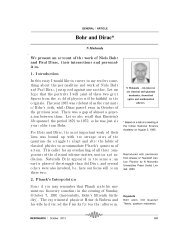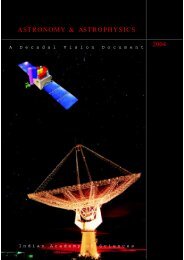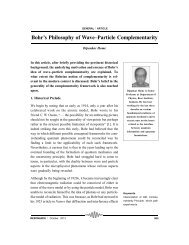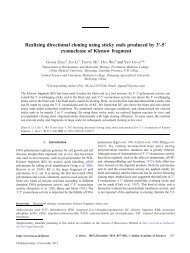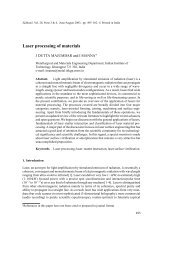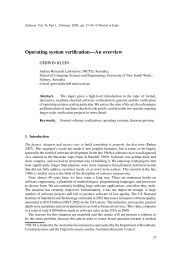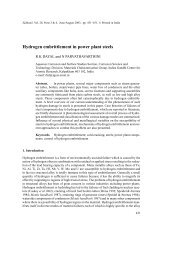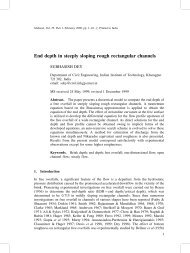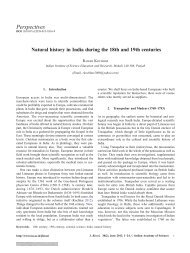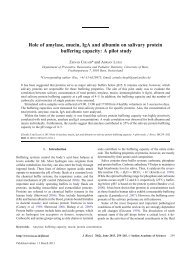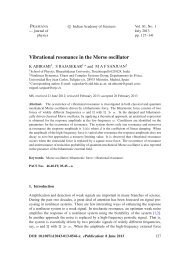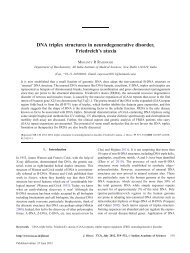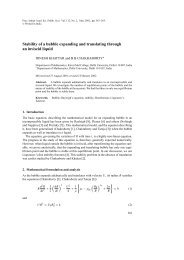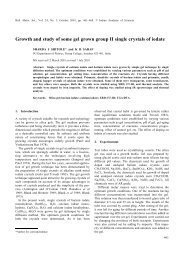Trained Scientific Women Power: How Much are we Losing and Why?
Trained Scientific Women Power: How Much are we Losing and Why?
Trained Scientific Women Power: How Much are we Losing and Why?
Create successful ePaper yourself
Turn your PDF publications into a flip-book with our unique Google optimized e-Paper software.
METHODOLOGY<br />
The aim of the present study, “<strong>Trained</strong> <strong>Scientific</strong><br />
<strong>Women</strong> <strong>Po<strong>we</strong>r</strong>: <strong>How</strong> <strong>Much</strong> <strong>are</strong> <strong>we</strong> <strong>Losing</strong> <strong>and</strong><br />
<strong>Why</strong>?” jointly conducted by the National Institute<br />
of Advanced Studies (NIAS) <strong>and</strong> the Panel for <strong>Women</strong><br />
in Science of the Indian Academy of Sciences was to<br />
investigate the reasons for poor participation of<br />
women with doctorates in Science, Engineering or<br />
Medicine, in c<strong>are</strong>ers in Science. Specifically, the<br />
objective of the study was to examine the reasons<br />
for the loss entailed when women who have received<br />
the highest level of scientific training gained at the<br />
doctoral level <strong>are</strong> not engaged in c<strong>are</strong>ers that utilize<br />
that training <strong>and</strong> experience, thus indicating a<br />
mismatch bet<strong>we</strong>en their qualification <strong>and</strong><br />
employment at lo<strong>we</strong>r levels of Science. The objective<br />
was to develop a comprehensive set of<br />
recommendations, policies, interventions <strong>and</strong><br />
strategies in order to check the loss of trained<br />
scientific women po<strong>we</strong>r.<br />
A unique strength of the project has been the<br />
involvement of a team of scientists <strong>and</strong> social<br />
scientists in order to analyze this problem to develop<br />
more holistic <strong>and</strong> comprehensive policies. This<br />
collaboration has ensured that a deeper<br />
underst<strong>and</strong>ing of the processes <strong>and</strong> milieu of<br />
scientific research <strong>and</strong> scientific c<strong>are</strong>ers can be<br />
obtained with the help of the scientists, while<br />
simultaneously applying the expertise of sociological<br />
perspectives <strong>and</strong> wide-range of methodology<br />
available to the social scientists who bring their<br />
unique training <strong>and</strong> perspective to problems related<br />
to human behaviour <strong>and</strong> functioning.<br />
Objectives of the Research Study<br />
The specific objectives of the research study <strong>we</strong>re<br />
as follows:<br />
1. To create a database of women scientists with a<br />
PhD in Science, Engineering or Medicine;<br />
2. To analyze trends <strong>and</strong> reasons for the drop-out<br />
among women scientists from a research based<br />
c<strong>are</strong>er; <strong>and</strong><br />
3. To develop a set of comprehensive<br />
recommendations to retain women in Science.<br />
Methodology<br />
Sample: The aim of the project was to obtain a<br />
picture of the nation-wide loss of trained scientific<br />
women po<strong>we</strong>r, by sampling a representative number<br />
of scientists <strong>and</strong> documenting reasons for this loss<br />
of human po<strong>we</strong>r, so that appropriate interventions,<br />
policies <strong>and</strong> strategies may be framed to check this<br />
loss. It was also planned to sample a proportionate<br />
number of men scientists on a nation wide basis to<br />
allow for a comparative study of the reasons for the<br />
loss of scientific personnel.<br />
Based on the objectives of the study, a total of 2369<br />
scientists who had completed a PhD in Science,<br />
Engineering or Medicine <strong>we</strong>re registered. Of these,<br />
1966 <strong>we</strong>re women <strong>and</strong> 403 <strong>we</strong>re men. Zone-wise,<br />
discipline-wise, <strong>and</strong> category-wise break-up of the<br />
scientists registered on the database is given below.<br />
Graph I: Zone-wise Distribution of Database Registrants (Refer Appendix I for the table)<br />
19



